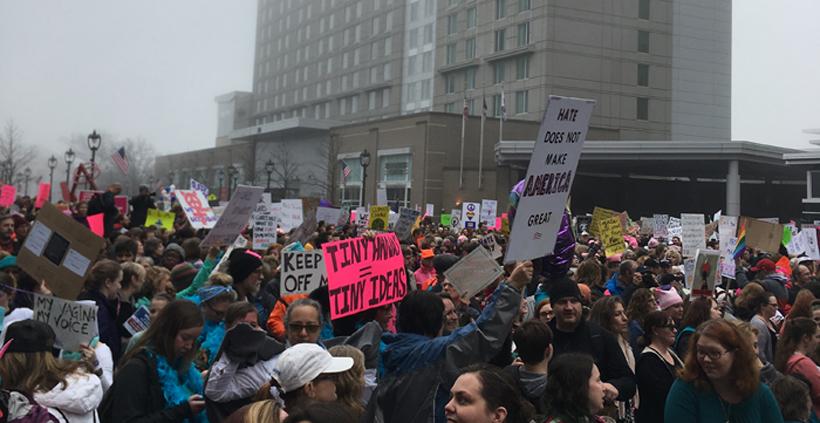Raleigh marches for women
On Saturday, January 21, 17 million people, mostly women, in Raleigh gathered to advocate for women’s rights. Marchers met at City Plaza on Fayetteville Street at 10 a.m, began marching at 10:30 a.m., and held a rally at 11:30 a.m.
“I went with my mom. I think it’s really important to stand up for women’s rights because even after all of the advances we’ve had in society, there’s still a lot we need to improve on. Women deserve to be heard,” junior Izzy Rodriguez said.
Organizers were inspired to march after the results of the presidential election, but it wasn’t simply to take a stand against President Donald Trump. It highlights the issues that women have faced for years, such as reproductive rights, racial inequality, wage gap, LGBT rights, and maternity leave.
“It was awesome. I’ve never been so motivated or proud to be a woman. It gave me hope for the future with the amount of diversity there,” junior Darcy McMillan said.
Other North Carolinian cities, like Charlotte, Greensboro, and Asheville, also held marches. North Carolina was the subject of controversy after the Public Facilities Privacy and Security Act, known as HB2, was passed in March 2016. The march echoes past social reform that protesters fought for, like the Women’s Suffrage Movement and the Civil Rights Movement.
“I’m proud that women are standing together and supporting each other, especially in a time like this,” junior Camryn Darragh said.
The event is a “sister march” to the Women’s March that was held in Washington, D.C. on the same day. Hundreds of sister marches were held across the United States, scheduled for the day after Trump took office. Celebrity women also rallied together in protest, including Madonna, Cher, Alicia Keys, and Scarlett Johanssen.
Marches were also held in several countries, such as France, Mexico, and Canada, as part of Women’s March Global; the movement follows H.E.R.S. which stands for Health, Economic Security, Representation, and Safety.
“Elizabeth Cady Stanton said, ‘The best protection any woman can have is courage.’ I love that women are taking a stand and speaking up for what they believe in. It’s powerful and inspiring,” junior Flor Romero said.





